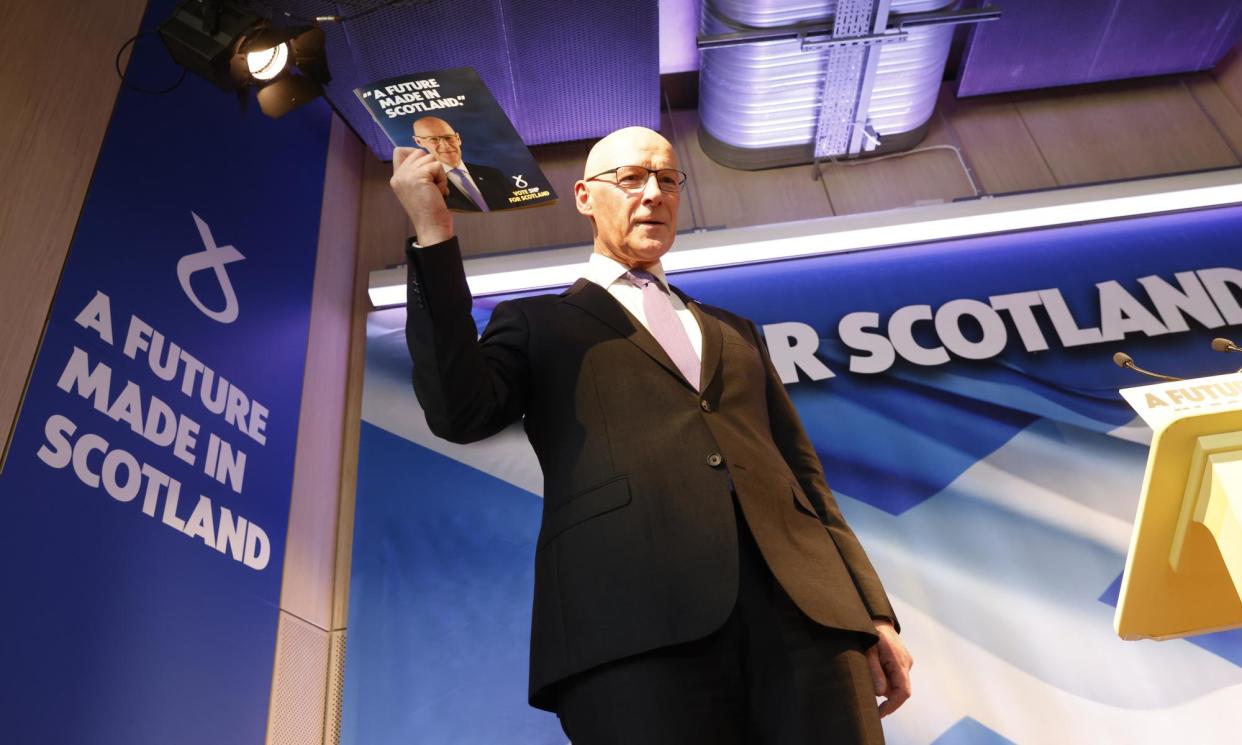Climate, NHS and independence: key takeaways from the SNP manifesto

John Swinney doubled down on the Scottish National party’s commitment to independence and said his was the only party to oppose cuts as he launched its manifesto on Wednesday. Here are the key takeaways.
Independence
The manifesto states that if the SNP wins a majority of Scottish seats, the Scottish government will be “empowered to begin immediate negotiations” with Westminster on making independence a reality.
In a realignment of the party’s previous position, Swinney says this means negotiating a second referendum. The previous policy had suggested a second vote was not necessary, as the general election itself would amount to a “de facto referendum”.
But Conservatives and Labour have consistently stated that they will not grant Holyrood the requisite powers to hold a second referendum, while the Institute for Fiscal Studies warned that the SNP “ignores the potential hit to economic growth from leaving the UK, and the big fiscal challenges an independent Scotland would immediately have to confront”.
Focus on NHS
Swinney called on “progressive politicians south of the border” to join the SNP in pressing for greater funding for the NHS at a national level by a minimum of £10bn extra each year, generating an additional £1bn annually for NHS Scotland.
The manifesto also demands that the next UK government invest at least £6bn in additional funding to match Scotland’s most recent pay deals for NHS staff. It estimates that this would deliver about £600m in consequentials, which Scotland could then invest in NHS staff numbers, pay and conditions.
The manifesto also pledges to introduce a bill at Westminster to protect the health service from privatisation, which would stand as a legal guarantee to keep the NHS in public hands.
Climate and oil and gas transition
A day after the Scottish government missed another emissions target, the manifesto says a future UK government should invest £28bn annually in the green economy, a commitment dropped by the Labour party earlier this year.
After the SNP was criticised for abandoning its previous presumption against new oil and gas licences, the manifesto advocates “an evidence-based approach” that would involve new licences being considered on a “case-by-case basis, through a robust climate compatibility assessment”.
Holyrood’s relationship with Westminster
Despite repeated attacks on Labour throughout the launch, the SNP also sets out areas of cooperation with a future Starmer government, for example, supporting plans to put VAT on private school fees while also reforming the tax in Scotland across the hospitality and tourism sectors.
Swinney also underlines his willingness to reset the relationship between Holyrood and Westminster, which he said had been characterised by “total and utter disrespect” under the Tories.
Cost of living
SNP MPs at Westminster would push for the introduction of a “social tariff” for energy bills for elderly people, those on low incomes and disabled people. It would be funded by general taxation and “an obligation” on the profits of power companies.
The manifesto calls on the next UK government to bring forward an immediate emergency budget to “reverse cuts to public spending and deliver meaningful investment in economic growth, including green energy”.
It also backs an essentials guarantee, which would ensure that basics such as food and utilities are affordable to all.


